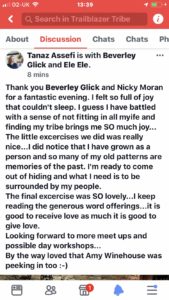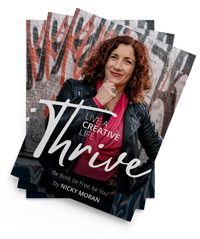A couple of weeks ago, Bev and I hosted a fantastic event for our creative community. We’re thrilled that Trailblazer Tribe Live seems to be giving creative people a space to build deeper connections than they would get at your average networking event.
We talked about the importance of developing a mindset that values communicating about your work regularly and being aware of the impact you have.
We ended the evening by giving everyone a ‘word shower’. We invited each participant to stand up and say a few words about themselves so that everyone in the room could write down an affirmative word or two that captured how they came across.
How often have you had feedback like this – feedback that’s positive, uplifting and really focuses on your qualities?
The group insisted that Bev and I were also given the experience and we both went home with a pocket load of Post-Its featuring words such as ‘inspiring’ and ‘wise’. It feels good when you make a difference.



When we went home, we were indundated with acknowledging posts on social media, with messages of appreciation. It felt so good to receive this kind of feedback.
By contrast, in the same week, I had a different kind of feedback. The kind of feedback you know you should brush off, but it stings.
“You just weren’t as good as usual. You didn’t have your spark. A couple of my friends said the same about you.”
Ouch. My friend, a musician, was giving me feedback on a vocal performance from the night before. As I heard his words, I felt a shock wave running through every cell of my body. My eyes welled up with tears. I knew he was right. The gig was fun, but I really wasn’t on my game. I’d knocked over a music stand in the middle of a song, forgot a whole verse and ended up having a coughing fit in the middle of my final song. I was frustrated, but had reassured myself that overall I sang well. The directness of my friend’s feedback caught me off guard. I went home feeling devastated. Was it time to leave the band? Had I completely embarrassed myself? Was I complete and utter failure?
As these critical voices in my head grew bigger, I knew that I was under attack from a negative shitstorm in my brain and if I continued with this line of thought, I was likely to make a bad decision. So I did what I know best – I watched a favourite series on Netflix, tucked myself into bed and waited for the emotional storm to clear.
By the morning, I woke up feeling better. With more perspective, I realised that this was a perfect time to write a blog.
As creatives, we all have to deal with feedback and the skill of recovery is one of the most important of all when it comes to building resilience.
It doesn’t matter how long you’ve been in your profession or how unimportant the project, receiving a critical comment can hit you in the gut.
So I’ve come up with some strategies and thoughts on how you might manage this kind of moment and come out the other side feeling better and stronger.
1. Avoid catastrophising
Nobody is trained to give feedback and it can be clumsily delivered. Don’t assume it’s correct or that, in general, it means you are not good at what you do. It’s simply their opinion and their experience of you in that moment. Try to isolate the feedback and look at all the factors that were playing a part. You can also ask your critic to be more specific, so that you know what they are referring to.
In my case, I simply hadn’t been feeling well that day and was putting on a brave face. I had a huge coughing fit, so it was no surprise that I wasn’t as good as I can be! We all have our off days. By looking at all the factors, you can see the feedback as something specific rather than a general rule about you or your creative expression.
2. Reframe the feedback
Our minds can often perceive feedback as a threat to our survival. According to neuroscience, we have a negative bias in our brains that can lead us to omit information that is actually positive.
I heard the feedback as: ‘You are a terrible singer’, but what was actually being said was: ‘You are usually brilliant and this performance wasn’t up to your normal standard’. If I can see the feedback from a higher perspective, then I can then reflect on the feedback and grow.
3. Reflect – what was really going on?
Sometimes harsh feedback can give you insight into something that’s not working for you any more. Feedback may be an indication of something that needs to change.
Have you lost your passion? Are you bored? Sometimes we underperform because our hearts are no longer in the game. It may be time to do something else or quit.
Are you doing work that’s aligned with your natural skills? I’ve seen many creatives struggle in roles that simply weren’t right for them. I remember a photographer who was a natural people person and was incredible at showing people’s deeper personalities, but he didn’t thrive when he had to photograph a celebrity event. It just wasn’t his thing. Feedback can be useful to remind you of where your skills are a natural fit.
4. See it as useful training
Overall – feedback can hurt deeply, but it can be really useful when developing resilience, gaining insights into our passions and getting ourselves back on track.
My feedback reminded me that I’m human and it’s OK to be imperfect sometimes and that perhaps I should have rested rather than do the gig. I decided to reframe the experience as a lesson in being human.
I love it when I get great feedback and most of the time I do, but none of us will grow or make changes if we only get positive feedback in life. The harsher feedback can wake us up from complacency.
Finally – I think there’s also something to learn about giving feedback, which is a skill. But that’s another blog.
So, what about you – what have you learnt about giving or receiving feedback?
Do share your experiences below.





One Response
Great advice thanks Nicky